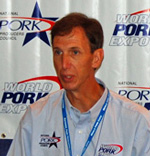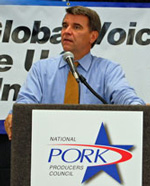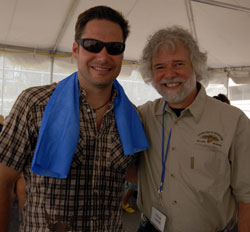 As we last left the Earthrace, a boat powered by 100 percent biodiesel trying to set a world record for circumnavigating the globe, she was limping into Singapore after hitting some debris near Palau and damaging a prop.
As we last left the Earthrace, a boat powered by 100 percent biodiesel trying to set a world record for circumnavigating the globe, she was limping into Singapore after hitting some debris near Palau and damaging a prop.
Today, the Earthrace is back in the water, racing across the India Ocean, still on pace to set the world record:
Despite the delays for repairs, the boat is still 1,556 miles ahead of the world record pace, set by the British Cable and Wireless team in 1998, despite sustaining significant damage in Palau and having to complete the last leg of the journey on one engine.
The crew has relied on the generosity of a number of companies that stepped forward to offer Earthrace support for speedy repair upon arrival to Singapore, particularly POSH SEMCO, an offshore marine service contractor, Assetton asset management, and J B Global, project sponsor. Repair work was successfully carried out in three days, after the ground crew spent the whole of last week sourcing components and shipyard space.
The next stop for the Earthrace is Cochin, India this coming Friday, June 13th. Let’s hope it’s actually a lucky day for the racers.
You can track Earthrace’s progress at www.earthrace.net.


 Hollywood is recognizing the importance of renewable energy and a greener approach to entertainment. The Los Angeles Film Festival, scheduled for June 19th-29th, will be using biodiesel, as well as offsetting carbon usage with investment in wind energy.
Hollywood is recognizing the importance of renewable energy and a greener approach to entertainment. The Los Angeles Film Festival, scheduled for June 19th-29th, will be using biodiesel, as well as offsetting carbon usage with investment in wind energy. And speaking of the silver screen, Josh Tickell’s biodiesel documentary, “Fields of Fuel,” will be playing this week at the
And speaking of the silver screen, Josh Tickell’s biodiesel documentary, “Fields of Fuel,” will be playing this week at the 
 In a letter to EPA Administrator Stephen Johnson, the group said that granting a waiver would be contrary to the agency’s mission of protecting human health and the environment. The letter adds that blame placed on ethanol for higher food prices is misguided.
In a letter to EPA Administrator Stephen Johnson, the group said that granting a waiver would be contrary to the agency’s mission of protecting human health and the environment. The letter adds that blame placed on ethanol for higher food prices is misguided. “This is not specifically an ethanol problem,” said
“This is not specifically an ethanol problem,” said  During a speech to pork producers at the expo, Deputy Agriculture Secretary Chuck Conner admitted that ethanol is a factor in the higher prices. “Ethanol is a new demand factor in the corn market, to the tune of about a third of our production going forward,” Conner said. “Fortunately, we did produce 13 billion bushels of corn and so despite large quantities going to ethanol, we actually did feed more corn to livestock than in previous years, so we managed to grow that market for both feed and ethanol.”
During a speech to pork producers at the expo, Deputy Agriculture Secretary Chuck Conner admitted that ethanol is a factor in the higher prices. “Ethanol is a new demand factor in the corn market, to the tune of about a third of our production going forward,” Conner said. “Fortunately, we did produce 13 billion bushels of corn and so despite large quantities going to ethanol, we actually did feed more corn to livestock than in previous years, so we managed to grow that market for both feed and ethanol.” Over on our sister
Over on our sister 

 A report out from the International Energy Agency (IEA) says the world will need to spend $45 trillion if it wants to cut in half the amount of carbon dioxide emissions by 2050. And part of that money will need to be spent on solar and wind power.
A report out from the International Energy Agency (IEA) says the world will need to spend $45 trillion if it wants to cut in half the amount of carbon dioxide emissions by 2050. And part of that money will need to be spent on solar and wind power.